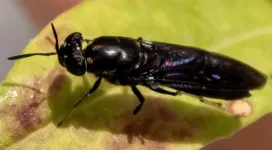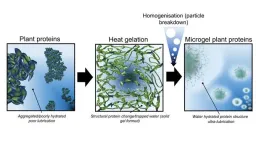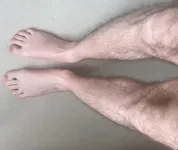(Press-News.org) Worcester, Mass. – August 10, 2023 – Worcester Polytechnic Institute (WPI) researcher Markus Nemitz is the recipient of a $599,815 CAREER Award from the National Science Foundation to develop an innovative architecture for low-cost custom robots capable of traversing challenging terrains by swimming, crawling, climbing, and diving through hostile and confined spaces as part of search-and-rescue operations.
Nemitz, an assistant professor in WPI’s Department of Robotics Engineering, will focus on developing small and flexible 3D-printed robots with integrated fluidic circuits that can be rapidly fabricated for specific disasters. His five-year project will involve testing these robots in a miniaturized model that will be built at WPI and replicate parts of the Tham Luang cave in Thailand where flooding trapped 12 members of a youth soccer team and their coach in 2018.
“Disasters often demand unique, specialized responses, such as was required for the Tham Luang cave crisis,” Nemitz said. “There lies immense potential in the development of small robots that are quickly fabricated from soft, flexible materials. These robots can significantly aid rescue efforts by exploring areas that pose potential hazards to humans or are otherwise inaccessible, including earthquake debris, flooded regions, and even nuclear accident sites.”
Nemitz’s project will involve making advances in soft robotics and printable robotics, fields that use flexible materials and advanced fabrication techniques. He will develop new principles for robot design and fabrication, specifically focusing on integrating electronic circuits with 3D printed fluidic circuits in the robots. The fluidic circuits will use pulses of air to store programs, process data, and execute simple tasks that control the robots. The resilience of fluidic circuits to mechanical damage and electromagnetic interference, combined with traditional electronics, promises to expand the capabilities of the robots significantly.
Design possibilities for these robots are vast, with size variations ranging from as small as a mouse to no bigger than a basketball. Using commercial 3D printers and elastomeric filaments, Nemitz will ensure the feasibility and efficacy of the robots by evaluating the time taken to design and fabricate them and assessing their performance in reaching designated targets within the lab-based model cave system.
In addition to the technical aspects of the project, Nemitz will develop a hands-on robotics summer camp exclusively for female high school students. This initiative aligns with the plan to launch a new undergraduate course on printable robotics.
The project builds on Nemitz’s research into soft, programmable robots and promises potential applications to additional fields such as space exploration, climate monitoring, and inspection operations in hostile settings.
“Robots can go to places beyond human reach,” Nemitz said. “Equipped with sensors such as microphones and cameras, these robots will enhance the capabilities of rescuers, especially during natural disasters. To ensure a dynamic and rapid response to emergencies, we must continually innovate and develop new technologies. Robotics is at the forefront of this development.”
About WPI
WPI is a top-tier STEM-focused research university and a recognized pioneer and global leader in project-based learning. Founded in 1865 on the principle that students learn most effectively by applying the theory learned in the classroom to the practice of solving real-world problems, WPI’s continued mission is to transform lives, turn knowledge into action to confront global challenges, and revolutionize STEM through distinctive and inclusive education, projects, and research. WPI’s project-based curriculum engages undergraduates in solving important scientific, technological, and societal problems throughout their education and at more than 50 project centers around the world. Today WPI offers more than 70 bachelor’s, master’s, and doctoral degree programs across 18 academic departments in science, engineering, technology, business, the social sciences, and the humanities and arts. Its faculty and students pursue groundbreaking research to meet ongoing challenges in health and biotechnology; robotics and the internet of things; advanced materials and manufacturing; cyber, data, and security systems; learning science; and more. www.wpi.edu
Contact:
Jon Cain
Senior Public Relations Manager
Marketing Communications
774-437-2157
media@wpi.edu
END
Worcester Polytechnic Institute researcher receives $599,815 grant to develop 3D printable robots for search-and-rescue operations
Markus Nemitz’s project will pave the way for custom 3D-printed robots that swim, crawl, climb, and dive
2023-08-14
ELSE PRESS RELEASES FROM THIS DATE:
Riding a wave to better medical diagnosis
2023-08-14
Medical imaging via X-rays, CT scans, MRIs and ultrasounds provide health-care professionals with unique perspectives and a better understanding of what’s happening inside a patient’s body. Using various forms of waves, these machines can visualize many unseen ailments and diseases.
This imaging is beneficial for health-care professionals to make correct diagnoses, but the added insight of spectroscopy provides even more detail. Spectroscopy offers a means to identify biomolecules within specimens through ...
Death tolls from climate disasters will ‘balloon’ without investment in Africa’s weather stations
2023-08-14
The climate crisis is increasing the frequency and intensity of floods, droughts and heatwaves, with Africa expected to be among the global regions hit hardest.
Yet the systems and technologies across the continent that monitor and forecast weather events and changes to water levels are “missing, outmoded or malfunctioning” – leaving African populations even more exposed to climate change.
This is according to a team of risk experts and climatologists from the UK and Africa led by the University of Cambridge, who ...
Transforming flies into degradable plastics
2023-08-14
SAN FRANCISCO, Aug. 14, 2023 — Imagine using insects as a source of chemicals to make plastics that can biodegrade later — with the help of that very same type of bug. That concept is closer to reality than you might expect. Today, researchers will describe their progress to date, including isolation and purification of insect-derived chemicals and their conversion into functional bioplastics.
The researchers will present their results at the fall meeting of the American Chemical Society (ACS). ACS Fall 2023 is a hybrid meeting being held virtually and in-person Aug. 13–17, and features about 12,000 presentations on a wide range of science topics.
“For ...
Irrigating more US crops by mid-century will be worth the investment
2023-08-14
With climate change, irrigating more crops in the United States will be critical to sustaining future yields, as drought conditions are likely to increase due to warmer temperatures and shifting precipitation patterns. Yet less than 20% of croplands are equipped for irrigation.
A Dartmouth-led study finds that by the middle of the 21st century under a moderate greenhouse gas emissions scenario, the benefits of expanded irrigation will outweigh the costs of installation and operation over an expanded portion of current U.S. ...
New statement urges engaging patients in their care, collaborating on treatment decisions
2023-08-14
DALLAS, Aug. 14, 2023 - A new American Heart Association scientific statement highlights evidence that supports shared decision-making, a term that describes the process of ensuring patients have the knowledge and tools to make decisions about their health in collaboration with their professional health care team. The statement publishes today in the American Heart Association’s flagship, peer-reviewed journal Circulation.
More than 100 trials have demonstrated that shared decision-making ...
Making plant-based meat alternatives more palatable
2023-08-14
New colloidal technique could give a juicy sensation without adding fat
Switch to plant-based diets needed to hit climate change targets
One of the biggest obstacles to the uptake of plant-based alternatives to meat is their very dry and astringent feel when they are eaten.
Scientists, led by Professor Anwesha Sarkar at the University of Leeds, are revolutionising the sensation of plant proteins, transforming them from a substance that can be experienced as gloopy and dry to one that is juicy and fat like.
And the only substance they are adding to the plant proteins is water.
Plant protein microgels
To ...
3D-printed vegan seafood could someday be what’s for dinner (video)
2023-08-13
SAN FRANCISCO, Aug. 13, 2023 — In the refrigerated grocery store aisle, meat alternatives greatly outnumber plant-based seafoods. But more mock seafood options are needed because of unsustainable fishing and aquaculture practices, which can deplete the supply and harm the environment. Today, researchers present a new approach for creating desirable vegan seafood mimics that taste good, while maintaining the healthful profile of real fish. They 3D-printed an ink made from microalgae protein and mung bean protein, and their proof-of-concept calamari rings can even be air-fried for a quick, tasty snack.
The researchers will present their results at the fall meeting of the American ...
ORNL buildings researchers earn top ASHRAE honors
2023-08-12
Kashif Nawaz and Mahabir Bhandari, building technologies researchers at the Department of Energy’s Oak Ridge National Laboratory, were recognized for research achievements in support of ASHRAE during the 2023 annual conference of the national heating, refrigerating, and air-conditioning engineering society.
Nawaz, a distinguished researcher and head of ORNL’s Buildings Technologies Research Section, received the Crosby Field Award, which honors the highest-rated paper presented before a technical session, a symposium or poster session ...
Raising awareness of Long Covid ‘blue legs’ symptom
2023-08-12
An unusual case of a Long Covid patient’s legs turning blue after 10 minutes of standing highlights the need for greater awareness of this symptom among people with the condition, according to new research published in the Lancet.
The paper, authored by Dr Manoj Sivan at the University of Leeds, focuses on the case of one 33-year man who developed with acrocyanosis – venous pooling of blood in the legs.
A minute after standing, the patient’s legs began to redden and became increasingly blue over time, with veins becoming more prominent. After 10 minutes the colour was much more pronounced, with the patient ...
For labrum tears, regrowth rather than repair
2023-08-12
Tears to the glenoid labrum—cartilage tissue that lines the shoulder where the arm joins—can be repaired with arthroscopic surgery, which significantly weakens the joint and involves a lengthy recovery.
Liping Tang, a bioengineering professor at The University of Texas at Arlington, is developing a new method to repair labrum tears that would enable the body to regenerate tissue to completely reattach the sides of the tear. He recently received a five-year, $2.1 million grant from the National Institutes of Health’s National Institute of Arthritis and Musculoskeletal and Skin Diseases for the research, which would improve the current standard of care ...
LAST 30 PRESS RELEASES:
ASU researchers to lead AAAS panel on water insecurity in the United States
ASU professor Anne Stone to present at AAAS Conference in Phoenix on ancient origins of modern disease
Proposals for exploring viruses and skin as the next experimental quantum frontiers share US$30,000 science award
ASU researchers showcase scalable tech solutions for older adults living alone with cognitive decline at AAAS 2026
Scientists identify smooth regional trends in fruit fly survival strategies
Antipathy toward snakes? Your parents likely talked you into that at an early age
Sylvester Cancer Tip Sheet for Feb. 2026
Online exposure to medical misinformation concentrated among older adults
Telehealth improves access to genetic services for adult survivors of childhood cancers
Outdated mortality benchmarks risk missing early signs of famine and delay recognizing mass starvation
Newly discovered bacterium converts carbon dioxide into chemicals using electricity
Flipping and reversing mini-proteins could improve disease treatment
Scientists reveal major hidden source of atmospheric nitrogen pollution in fragile lake basin
Biochar emerges as a powerful tool for soil carbon neutrality and climate mitigation
Tiny cell messengers show big promise for safer protein and gene delivery
AMS releases statement regarding the decision to rescind EPA’s 2009 Endangerment Finding
Parents’ alcohol and drug use influences their children’s consumption, research shows
Modular assembly of chiral nitrogen-bridged rings achieved by palladium-catalyzed diastereoselective and enantioselective cascade cyclization reactions
Promoting civic engagement
AMS Science Preview: Hurricane slowdown, school snow days
Deforestation in the Amazon raises the surface temperature by 3 °C during the dry season
Model more accurately maps the impact of frost on corn crops
How did humans develop sharp vision? Lab-grown retinas show likely answer
Sour grapes? Taste, experience of sour foods depends on individual consumer
At AAAS, professor Krystal Tsosie argues the future of science must be Indigenous-led
From the lab to the living room: Decoding Parkinson’s patients movements in the real world
Research advances in porous materials, as highlighted in the 2025 Nobel Prize in Chemistry
Sally C. Morton, executive vice president of ASU Knowledge Enterprise, presents a bold and practical framework for moving research from discovery to real-world impact
Biochemical parameters in patients with diabetic nephropathy versus individuals with diabetes alone, non-diabetic nephropathy, and healthy controls
Muscular strength and mortality in women ages 63 to 99
[Press-News.org] Worcester Polytechnic Institute researcher receives $599,815 grant to develop 3D printable robots for search-and-rescue operationsMarkus Nemitz’s project will pave the way for custom 3D-printed robots that swim, crawl, climb, and dive








